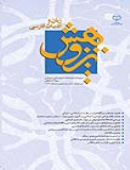جادوي مكاشفت
محورهای موضوعی : پژوهشهای ادبیات کلاسیک ایران
1 -
کلید واژه: ابنعربي تفسير قرآن تأويل شهود صوفيه نقدادبي,
چکیده مقاله :
متون صوفيانه با وجود رمز و رازها و پيچيدگيهاي معنايي و مفهومي و نيز بهرهگيري از زبان نمادين، آهنگين، سحرآميز و تأثيرگذار، از ساير متون (ادبي و غير ادبي) آشكارا ممتاز و متفاوت هستند. عدهاي اين تفاوت را صرفاً در ساختار زباني اين متون ديده و رموز معنايي آن را نيز برخاسته از همان زبان ويژه دانستهاند. بر خلاف ديدگاه فوق، در اين نوشته به تقدم مفهوم و معني بر زبان در متون صوفيه تأكيد شده و نشان داده ميشود كه كشف، فهم، تأويل و انشراح معني، مقدم بر الفاظ و تناسبات زباني است. هر چند دريافتهاي تازه مبتني بر شهود معني و مفهوم، خود زبان تازهاي را به وجود ميآورد كه البته با ساير زبانها متفاوت است. بدين منظور فهم و تفسير مفسران عامه از يك آيه قرآن كريم، با فهم و تأويل صوفيان خراساني و پس از آن ابنعربي در فصوص الحكم مورد بررسي قرار گرفته است. حاصل اين نوشته و تحقيق علاوه بر اثبات تقدم معني بر لفظ و انديشه بر زبان در متون صوفيه، نشان دادن سير و تحول تكويني تأويل عرفا از آيات قرآن كريم تا زمان ابنعربي و تأثير و تأثر آنها از يكديگر ميباشد.
The mystical texts while including some secrets, mystery, conceptual and meaning complications and also using the symbolic, impressive, magic and tuneful language, differ from the others literary and non-literary texts considerably. These differences are only considered by some of the intellectuals as the differences in language structure and know the meaning related complexity originated in the especial features of that language. Opposed to the mentioned viewpoints, this essay brings the priority of the concept and meaning over the language in mystical texts into sharp focus and reveals that revelation, understanding, interpretation and explanation of the meaning have priority over the terms and appropriateness of the language. Although the new findings based on revelation of meaning and concept creates a new language, it will be different from the other languages. In this regard, the understanding and interpretation by the general interpreters upon a the Holy Quran verses as well as the Khorasan mystics and Ibne Arabi’s ones in Fososelhekam, have been studied. The result of this essay and study have shown that meaning has priority over the terms and thought, in mystical texts. It also shows that the complementary development of the mystics’ understanding of the Holy Quran till the period of Ibne Arabi and their effects and interplay on each other.

